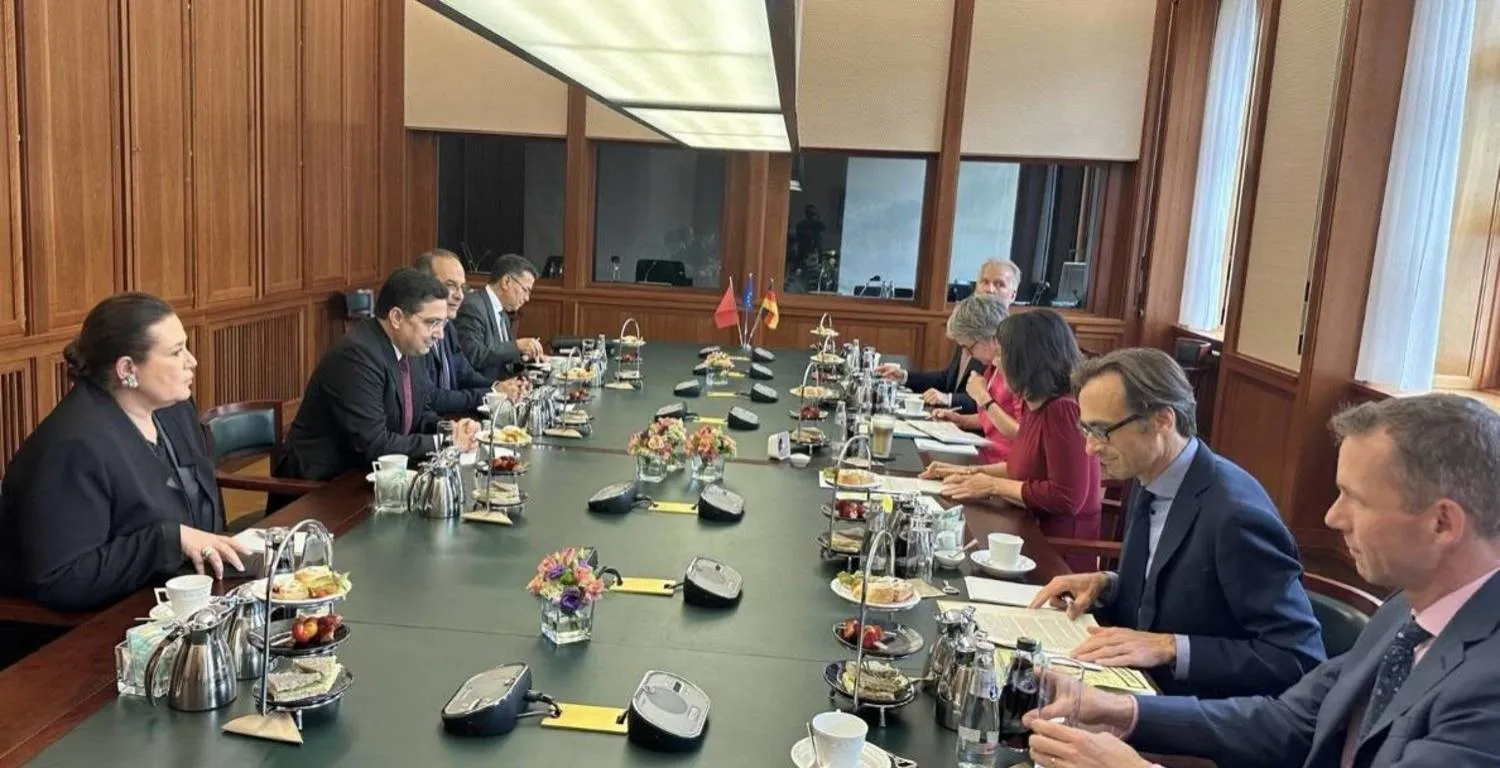Morocco and Germany agreed to launch their Multidimensional Strategic Dialogue, which will form the basis for moving forward within the framework of bilateral relations and promoting coherence in the various fields of bilateral cooperation.
The announcement came at the end of a meeting between Foreign Minister Nasser Bourita, who was on a working visit to Germany, and his German counterpart Annalena Baerbock.
Bourita's visit to Germany is part of implementing the Strategic Dialogue established between the two countries under the joint declaration adopted during Baerbock's visit to Morocco in August 2022.
The Strategic Dialogue is held once every two years, alternately in Morocco and Germany, under the chairmanship of the two foreign ministers.
The Dialogue comes within the shared desire to strengthen their political, economic, cultural, and humanitarian relations, promote democracy, the rule of law, and good governance, develop trade and investments, cooperate on climate policy, biodiversity policy, and green energy solutions.
It will be based on shared values and mutual respect to strengthen the principles and foundations of bilateral relations to preserve and enhance the priority interests of the two countries.
At the joint press conference, Bourita and Baerbock lauded the close and friendly relations between the two countries and the positive dynamic that characterizes the bilateral relationship since adopting the joint declaration.
The two government officials reaffirmed their common will to boost the long-term bilateral relations and establish an enhanced partnership looking to the future.
They praised the distinction of bilateral economic and trade relations and reaffirmed their desire to boost and open them to new sectors, especially renewable energies, infrastructure, and digitization.
They affirmed their shared interest in intensifying and following up on this cooperation to expand its scope and consolidate its gains.
Bourita and Baerbock also stressed the importance of the longstanding bilateral partnership in security and welcomed the strengthening of the alliance to continue facing common challenges, mainly through high-level exchanges.
The two ministers highlighted the close cooperation in immigration, stressing the rational approach taken between the two countries in managing this issue.
They pointed out the importance of cooperation in the cultural and academic fields to promote human and economic development.
Addressing climate change, the two ministers reaffirmed their joint would plead for an ambitious international commitment to combat the effects of climate change.
The two ministers agreed on various regional and international issues and pledged to continue consultation and coordination, especially in Libya, the Sahel region, and the Middle East.
- Bourita: a historical relationship
Bourita noted that the historical relationship between Morocco and Germany witnessed a very positive dynamic after the message German President Steinmeier sent to King Mohammed VI.
He pointed out that King Mohammed VI issued his instructions to make Germany one of Morocco's priority strategic partners based on mutual trust and respect for the joint interests.
Bourita explained that establishing the Strategic Dialogue testifies to the standard will between the two countries to further deepen this partnership.
- Baerbock: tangible results
Baerbock highlighted the role played by Morocco under the leadership of King Mohammed VI, especially in combating climate change.
She said Morocco had adopted the best standards in combating climate change in the region through its various measures and ambitious national goal to reduce carbon dioxide emissions.
The Minister noted that these efforts culminate in "very tangible" results, referring to the Noor solar farm, which provides 1.3 million people with clean electric energy.
She also welcomed the partnership between Germany and Morocco in energy transition, noting that cooperation between the two countries in green hydrogen was the focus of her discussions with Bourita.
The German Minister confirmed that the two countries are determined to work together on projects within the renewable energy sector.
- The Sahara Initiative
Berlin renewed its support for the Western Sahara Autonomy Proposal, an initiative proposed by Morocco in 2007 as a possible solution to the Western Sahara conflict, as a "serious and credible" effort and a "very good basis" for reaching a solution.
After the talks, Baerbock reaffirmed Germany's long-term support for the UN-led process to reach a realistic, pragmatic, sustainable, and mutually acceptable political solution.
The two ministers reaffirmed their support for the relevant Security Council resolutions, which recorded the role and responsibility of the parties in the search for a realistic, pragmatic, sustainable, and consensus-based political solution.
The two countries also reaffirmed their support for the UN Sec-Gen Special Envoy, Staffan de Mistura, and his efforts to advance the political process based on the relevant UN Security Council resolutions.









